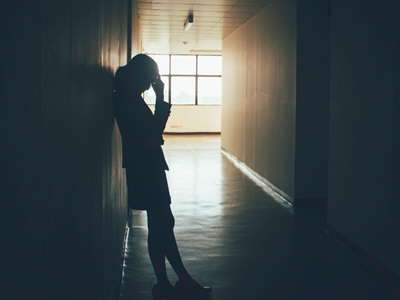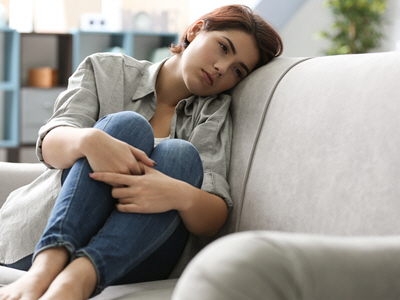
Anxiety and Depression
Beyond Depression
Your heart is pounding!
 Experiencing a pounding heartbeat, an accelerated heartrate, and/or muscle tension are primary indicators of anxiety/anxiety attack. People may also experience sweating, sensations of shortness of breath, smothering, or choking.
Experiencing a pounding heartbeat, an accelerated heartrate, and/or muscle tension are primary indicators of anxiety/anxiety attack. People may also experience sweating, sensations of shortness of breath, smothering, or choking.
Feelings of impending doom or being out of control may be overwhelming.
Occasional anxiety is an expected part of life. You might feel anxious when faced with a problem, before taking a test, or before making an important decision or planning for a joyous occasion.
But anxiety disorders involve more than temporary worry or fear. For a person with an anxiety disorder, the anxiety does not go away and can get worse over time.
The symptoms can interfere with daily activities such as job performance, school and work. The fear and anxiety can cause significant problems in areas of their life, such as social interactions and relationships and controlling feelings of worry.
 Discouraged and unmotivated… when getting out of bed is too much.
Discouraged and unmotivated… when getting out of bed is too much.
Depression is a condition in which a person feels discouraged, sad, hopeless, unmotivated, or disinterested in life in general.
Most people will experience these emotions for short periods of time, and then return to normal functioning.
When such feelings last for more than two weeks and the feelings interfere with daily activities such as taking care of family, spending time with friends, or going to work or school, it’s likely a major depressive episode.
Some people may experience these symptoms more mildly, but for longer periods of time. This may involve low mood in conjunction with two other symptoms of depression, lasting at least two years.
Although mild symptoms are less severe than major depression, it involves the same symptoms as major depression, mainly low energy, poor appetite or overeating, and insomnia or oversleeping.
Anxiety and depression are intricately linked.
 When you are anxious, your predominant feeling is that of worry. You feel like you can’t relax, and that danger is everywhere in some form or another. However, the irritability associated with depression gives you a similar feeling. Often, the overlap between the two can be difficult to tell them apart.
When you are anxious, your predominant feeling is that of worry. You feel like you can’t relax, and that danger is everywhere in some form or another. However, the irritability associated with depression gives you a similar feeling. Often, the overlap between the two can be difficult to tell them apart.
Avoidance or Withdrawal
Anxiety makes people retreat from situations out of fear that some misfortune may happen. Depression also causes people to withdraw from the world. When you go into that dark space, the thought never crosses your mind to engage with other people.
Negative Thinking
When you are depressed, you see the worst in every situation. The depression includes negative thoughts about yourself, the world, and the future.
When you focus on negative thoughts, you may end up diagnosing yourself with anxiety and not recognize the major impact that your depression has on your thinking.
There are ways to cope with both anxiety and depression.
You may experience anxiety or depression alone or a combination of both. Learn ways to cope with anxiety and/or depression that will increase your quality of life and cause you to live a happier, more fulfilling life.
Now is the time to begin a change…
Call (703) 672-0393 or complete the contact form below.
